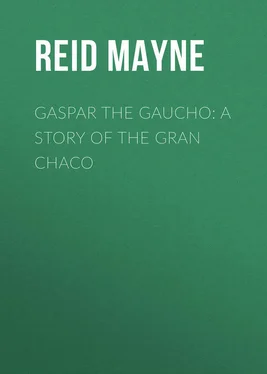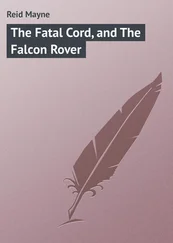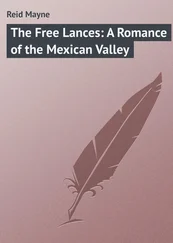Mayne Reid - Gaspar the Gaucho - A Story of the Gran Chaco
Здесь есть возможность читать онлайн «Mayne Reid - Gaspar the Gaucho - A Story of the Gran Chaco» — ознакомительный отрывок электронной книги совершенно бесплатно, а после прочтения отрывка купить полную версию. В некоторых случаях можно слушать аудио, скачать через торрент в формате fb2 и присутствует краткое содержание. Жанр: literature_19, foreign_antique, foreign_prose, на английском языке. Описание произведения, (предисловие) а так же отзывы посетителей доступны на портале библиотеки ЛибКат.
- Название:Gaspar the Gaucho: A Story of the Gran Chaco
- Автор:
- Жанр:
- Год:неизвестен
- ISBN:нет данных
- Рейтинг книги:3 / 5. Голосов: 1
-
Избранное:Добавить в избранное
- Отзывы:
-
Ваша оценка:
- 60
- 1
- 2
- 3
- 4
- 5
Gaspar the Gaucho: A Story of the Gran Chaco: краткое содержание, описание и аннотация
Предлагаем к чтению аннотацию, описание, краткое содержание или предисловие (зависит от того, что написал сам автор книги «Gaspar the Gaucho: A Story of the Gran Chaco»). Если вы не нашли необходимую информацию о книге — напишите в комментариях, мы постараемся отыскать её.
Gaspar the Gaucho: A Story of the Gran Chaco — читать онлайн ознакомительный отрывок
Ниже представлен текст книги, разбитый по страницам. Система сохранения места последней прочитанной страницы, позволяет с удобством читать онлайн бесплатно книгу «Gaspar the Gaucho: A Story of the Gran Chaco», без необходимости каждый раз заново искать на чём Вы остановились. Поставьте закладку, и сможете в любой момент перейти на страницу, на которой закончили чтение.
Интервал:
Закладка:
They have not long to stay before seeing what they half expected to see – a party of Indians. Just as they have got well fixed in place, with some leafy branches in front forming a screen over their faces, at the same time giving them an aperture to peep through, the dusky cavalcade shows its foremost files issuing out from the bushes on the opposite side of the stream. Though still distant – at least, a quarter of a mile – both father and daughter can perceive that they are Indians; mounted, as a matter of course, for they could not and did not, expect so see such afoot in the Chaco. But Francesca’s eyes are sharper sighted than those of her father, and at the first glance she makes out more – not only that it is a party of Indians, but these of the Tovas tribe. The feathered manta of the young chief, with its bright gaudy sheen, has caught her eye, and she knows whose shoulders it should be covering.
“Yes, father,” she says, in whisper, as soon as sighting it. “They are the Tovas! See yonder! one of the two leading – that’s Aguara.”
“Oh! then, we’ve nothing to fear,” rejoins her father, with a feeling of relief. “So, Francesca, we may as well ride back out and meet them. I suppose it is, as I’ve been conjecturing; the tribe is returning to its old quarters. I wonder where they’ve been, and why so long away. But we shall now learn all about it. And we’ll have their company with us, as far as their talderia ; possibly all the way home, as, like enough, Naraguana will come on with us to the estancia. In either case – ha! what’s that. As I live, a white man riding alongside Aguara! Who can he be?”
Up to this, Halberger has neither touched his horse nor stirred a step; no more she, both keeping to the spot they had chosen for observation. And both now alike eagerly scan the face of the man, supposed to be white.
Again the eyes of the child, or her instincts, are keener and quicker than those of the parent; or, at all events, she is the first to speak, announcing a recognition.
“Oh, papa!” she exclaims, still in whispers, “it’s that horrid man who used to come to our house at Assuncion – him mamma so much disliked – the Señor Rufino.”
“Hish!” mutters the father, interrupting both with speech and gesture; then adds, “keep tight hold of the reins; don’t let the pony budge an inch!”
Well may he thus caution, for what he now sees is that he has good reason to fear; a man he knows to be his bitter enemy – one who, during the years of his residence in Paraguay, had repeatedly been the cause of trouble to him, and done many acts of injury and insult – the last and latest offered to his young wife. For it was Rufino Valdez who had been employed by the Dictator previously to approach her on his behalf.
And now Ludwig Halberger beholds the base villain in company with the Tovas Indians – his own friends, as he had every reason to suppose them – riding side by side with the son of their chief! What can it mean?
Halberger’s first thought is that Valdez may be their prisoner; for he, of course, knows of the hostility existing between them and the Paraguayans, and remembers that, in his last interview with Naraguana, the aged cacique was bitter as ever against the Paraguayan people. But no; there is not the slightest sign of the white man being guarded, bound, or escorted. Instead, he is riding unconstrained, side by side with the young Tovas chief, evidently in amicable relations – the two engaged in a conversation to all appearance of the most confidential kind!
Again Halberger asks, speaking within himself, what it can mean? and again reflecting endeavours to fathom the mystery: for so that strange juxtaposition appears to him. Can it be that the interrupted treaty of peace has been renewed, and friendship re-established between Naraguana and the Paraguayan Dictator? Even now, Valdez may be on a visit to the Tovas tribe on that very errand – a commissioner to arrange new terms of intercourse and amity? It certainly appears as if something of the kind had occurred. And what the Prussian now sees, taken in connection with the abandonment of the village alike matter of mystery – leads him to more than half-suspect there has. For again comes up the question, why should the Tovas chief have gone off without giving him warning? So suddenly, and not a word! Surely does it seem as if there has been friendship betrayed, and Naraguana’s protection withdrawn. If so, it will go hard with him, Halberger; for well knows he, that in such a treaty there would be little chance of his being made an object of special amnesty. Instead, one of its essential claims would sure be, the surrendering up himself and his family. But would Naraguana be so base? No; he cannot believe it, and this is why he is as much surprised as puzzled at seeing Valdez when he now sees him.
In any case things have a forbidding look, and the man’s presence there bodes no good to him. More like the greatest evil; for it may be death itself. Even while sitting upon his horse, with these reflections running through his mind – which they do, not as related, but with the rapidity of thought itself – he feels a presentiment of that very thing. Nay, something more than a presentiment, something worse – almost the certainty that his life is near its end! For as the complete Indian cohort files forth from among the bushes, and he takes note of how it is composed – above all observing the very friendly relations between Valdez and the young chief – he knows it must affect himself to the full danger of his life. Vividly remembers he the enmity of Francia’s familiar , too deep and dire to have been given up or forgotten. He remembers, too, of Valdez being noted as a skilled rastrero , or guide – his reputed profession. Against such a one the step he has taken to conceal himself is little likely to serve him. Are not the tracks of his horse, with those of the pony, imprinted in the soft mud by the water’s edge where they had halted? These will not be passed over by the Indians, or Valdez, without being seen and considered. Quite recent too! They must be observed, and as sure will they be followed up to where he and his child are in hiding. A pity he has not continued along the tapir path, still further and far away! Alas! too late now; the delay may be fatal.
In a very agony of apprehension thus reflecting, Ludwig Halberger with shoulders stooped over his saddle-bow and head bent in among the branches, watches the Indian cavalcade approaching the stream’s bank; the nearer it comes, the more certain he that himself and his child are in deadliest danger.
Chapter Seven.
Valdez the “Vaqueano.”
To solve the seeming enigma of Rufino Valdez travelling in the company of the Tovas Indians, and on friendly terms with their young chief – for he is so – it will be necessary to turn back upon time, and give some further account of the vaqueano himself, and his villainous master; as also to tell why Naraguana and his people abandoned their old place of abode, with other events and circumstances succeeding. Of these the most serious has been the death of Naraguana himself. For the aged cacique is no more; having died only a few days after his latest visit paid to his palefaced protégé.
Nor were his last moments spent at the tolderia , now abandoned. His death took place at another town of his people some two hundred miles from this, and farther into the interior of the Chaco; a more ancient residence of the Tovas tribe – in short, their “Sacred city” and burying-place. For it is the custom of these Indians when any one of them dies – no matter when, where, and how, whether by the fate of war, accident in the chase, disease, or natural decay – to have the body borne to the sacred town, and there deposited in a cemetery containing the graves of their fathers. Not graves, as is usual, underground; but scaffolds standing high above it – such being the mode of Tovas interment.
Читать дальшеИнтервал:
Закладка:
Похожие книги на «Gaspar the Gaucho: A Story of the Gran Chaco»
Представляем Вашему вниманию похожие книги на «Gaspar the Gaucho: A Story of the Gran Chaco» списком для выбора. Мы отобрали схожую по названию и смыслу литературу в надежде предоставить читателям больше вариантов отыскать новые, интересные, ещё непрочитанные произведения.
Обсуждение, отзывы о книге «Gaspar the Gaucho: A Story of the Gran Chaco» и просто собственные мнения читателей. Оставьте ваши комментарии, напишите, что Вы думаете о произведении, его смысле или главных героях. Укажите что конкретно понравилось, а что нет, и почему Вы так считаете.












